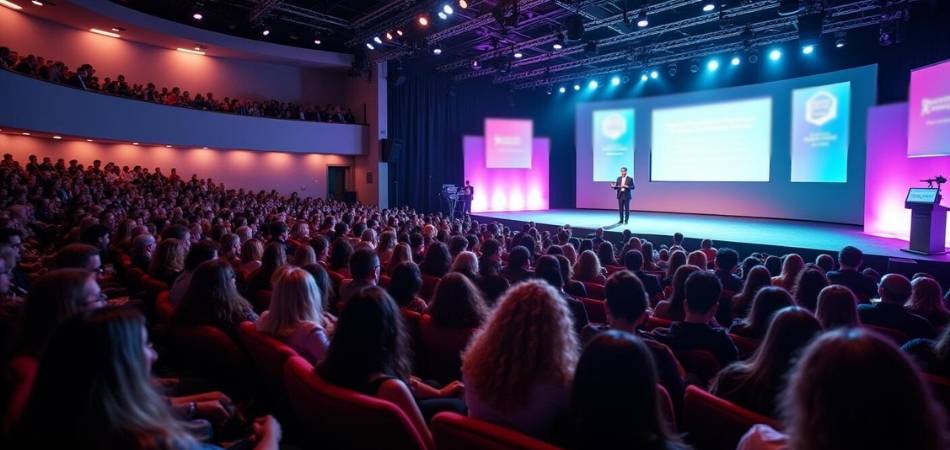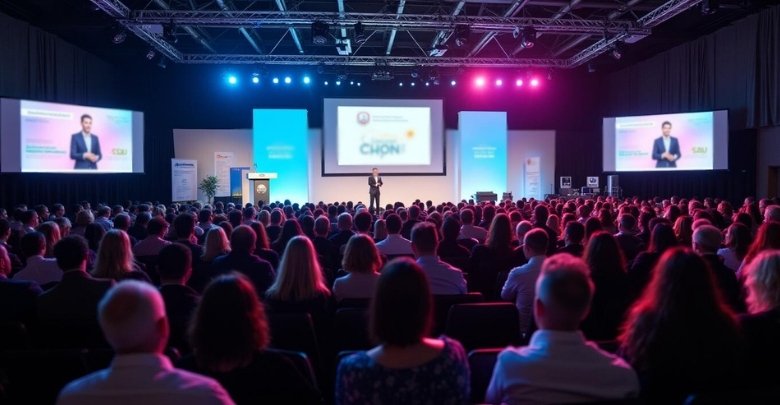Economic conferences have changed significantly over the past few years, with more focus placed on virtual and hybrid events, making them more accessible to a global audience. As the field of economics continues to grow, a key question arises: What is the purpose of an economics conference?
The purpose of these conferences is to provide a space for economists, researchers, and policymakers to discuss emerging trends, recent research, and key economic issues of the day. By providing a platform for in-depth discussions, they enable professionals to share knowledge, explore innovative ideas, and stay up-to-date.
Throughout this article, we will discuss the role of such conferences and how they help form the future of economic thought and practice in the future.
What Is the Purpose of an Economics Conference? — Learn in Details
A global economic conference brings together experts to share ideas, discuss insights, and discuss pressing issues in the economy. These gatherings encourage collaboration and help form the future of economic research and policy. Below, we’ll explore their purpose across various dimensions.

Encouraging Knowledge Exchange
Economics conferences provide a platform for experts to share their latest research and insights. Participants gain exposure to diverse perspectives and methodologies. Here, researchers discuss findings, developing a deeper understanding of complex economic phenomena. This exchange leads to innovative approaches to solving economic problems.
Exploring Emerging Trends
Discussions at these conferences are formed by current events and economic trends. Experts analyze market behaviors, technological advancements, and policy changes. This focus ensures participants remain informed about shifting economic landscapes. By addressing trends, conferences prepare attendees for future challenges.
Facilitating Collaboration
Conferences provide an opportunity for economists, policymakers, and industry leaders to network and collaborate. These events encourage interdisciplinary partnerships to tackle complex economic issues. Collaborative efforts often lead to innovative research and policy recommendations. Such networking strengthens professional relationships and encourages collective growth.
Shaping Policy Discussions
Policymakers often attend economic conferences to gather insights and refine their strategies. Discussions provide evidence-based recommendations to address economic challenges. Economists present case studies highlighting successful policy implementations. This interaction bridges the gap between academic research and practical applications.
Promoting Global Perspectives
Global economic conferences promote cross-cultural understanding by attracting participants from all over the world. Attendees discuss regional challenges and share strategies for global economic growth. This diversity enriches debates and broadens the scope of solutions. Global collaboration helps address interconnected economic issues effectively.
Advancing Education and Training
Workshops and seminars at these conferences help attendees improve their skills and knowledge. Young economists benefit from mentorship opportunities and practical training. Interactive sessions provide hands-on learning experiences in modern economic practices. This focus ensures continuous professional development for participants.
Driving Innovation
Economic conferences often spotlight the latest technologies and methods changing the field. These events highlight innovative tools for analyzing data and trends. Participants explore new theories and models that challenge traditional economic thinking. Innovation helps advance the discipline and solve emerging challenges.
Which Topics are Discussed at the Economics Conference?
Economic conferences are active spaces where experts discuss topics that form global economies. They explore a variety of pressing topics, sparking innovation and collaboration. Here are the key themes often covered at these gatherings:
Global Economic Trends and Challenges
Conferences on economics often highlight the shifting of economic power between nations. Events like the economics conference in Canada often focus on regional and global economic shifts. Often, emerging economies and their growth potential are hot topics of discussion. Debates also cover global challenges like inflation, recession risks, and geopolitical tensions.
Technological Impact on Economies
These conferences draw a great deal of attention to the role artificial intelligence plays in advancing industries. Discussions highlight how automation affects employment and productivity worldwide. Digital currencies, blockchain, and their implications on financial systems are often debated. The economic effects of advancements in green technology are also explored.
Policy Innovations and Reforms
Economists discuss innovative policies aimed at improving economic resilience and sustainability. They discuss taxation reforms designed to promote equitable economic growth. An in-depth look at social safety nets and welfare policies addressing inequality is also provided. Trade policies, tariffs, and global agreements are hotly debated in these meetings.
Climate Change and Economic Sustainability
Conversations address how climate change affects agricultural output, resource management, and long-term economic planning. Economists propose sustainable development strategies to combat the adverse effects of climate change. A great deal of attention is paid to the financial cost of transitioning to renewable energy systems. Their discussion explores the importance of international cooperation in addressing shared environmental problems.
Income Inequality and Social Mobility
The financial and social consequences of inequality are recurring topics in economics conferences. A panel of experts discusses strategies to improve social mobility through education and healthcare. The wealth gap’s impact on long-term economic stability is often the subject of intense discussion. Besides that, case studies highlight successful measures to address income inequality globally.
How to Join an Economics Conference?
Joining an economics conference is an exciting opportunity to learn, network, and share ideas. Proper preparation ensures a smooth experience and active participation. Here’s a step-by-step process to help you successfully join an economics conference:
Step 1: Identify the Right Conference
Research conferences that align with your interests and professional goals. Check the conference agenda, speakers, and themes for relevance. Consider whether the event offers virtual or in-person attendance options. Select a conference that best fits your expertise and objectives.
Step 2: Get an Invitation Letter
Many conferences require an invitation letter for attendance, especially for international events. Contact the organizers to request an official invitation. Provide necessary details, including your professional background and purpose of attending. This letter may also be needed for visa applications.
Step 3: Apply for a Visa (if Necessary)
If the conference is abroad, determine the visa requirements for the host country. Begin your application early to avoid last-minute delays. Include the invitation letter and other necessary documentation in your application. Follow the guidelines carefully for a hassle-free visa process.
Step 4: Plan Travel and Accommodation
Book your travel and accommodation well in advance to secure the best options. Choose a location near the conference venue for convenience. Consider affordable options if traveling on a budget. Confirm your bookings and keep a copy of all receipts for reference.
Step 5: Complete Registration and Documentation
Register for the conference within the specified deadline to secure your spot. Check the required documentation, including identification and payment receipts. Keep digital and physical copies of all important documents. Confirm your registration with the organizers to avoid any misunderstandings.
Step 6: Prepare for Active Participation
Create or polish your presentation if you’re speaking or presenting research. Practice delivering your content confidently and engagingly. Prepare materials for networking, like business cards or portfolios. Be ready to contribute actively during discussions and sessions.
The opportunity to network and learn is one of the most rewarding aspects of attending an economics conference. Being aware of the advantages of joining an economics conference helps maximize the benefits of these events. Make sure you prepare actively. Proper preparation ensures you make the most of this enriching experience.
Who are the Attendees at the Economics Conference?
Economics conferences attract a broad group of attendees, each bringing unique perspectives and expertise. These participants contribute to meaningful discussions on global economic issues. Here’s an overview of the types of attendees you’ll typically encounter.
- Academics and Researchers: Professors and researchers present their findings and discuss emerging economic theories. They aim to exchange ideas and encourage intellectual growth.
- Policy Makers and Government Officials: Government representatives attend to gain insights for crafting policies. Their participation bridges research and real-world economic governance.
- Industry Leaders and Executives: Business executives explore economic trends impacting their industries. They contribute by sharing practical experiences and strategies for economic adaptation.
- Students and Early Career Economists: Students attend to learn and network with experts in the field. Young economists often present fresh perspectives and innovative ideas.
- Financial Analysts and Investors: These professionals seek economic insights to guide investment decisions. Their focus is on understanding market trends and potential opportunities.
- NGO Representatives and Activists: NGO members engage in discussions about economic equality and sustainability. They highlight the role of economics in social change.
- Technology and Innovation Experts: Tech experts discuss the impact of advancements like AI and blockchain on economies. They provide critical insights into digital transformation.
- Media Professionals and Journalists: Journalists cover the event, reporting key takeaways and expert opinions. Their work ensures broader dissemination of the conference’s insights.
The Role of Networking at the Economics Conference
Networking provides an opportunity to build relationships, share ideas, and collaborate during economics conferences. These events encourage meaningful interactions that promote professional growth and innovation. Here’s how networking influences the experience at an economics conference:
Building Professional Relationships
Conferences bring together experts, allowing participants to form valuable connections in the economics field. Interactions often lead to long-term collaborations and partnerships. Engaging with peers broadens perspectives and strengthens professional networks. Such connections create opportunities for mentorship and knowledge sharing.
Exchanging Ideas and Insights
Networking provides a platform for participants to discuss emerging trends and economic theories. Open discussions help refine ideas and inspire new approaches. Conversations often spark innovative solutions to pressing economic challenges. These exchanges enrich knowledge and drive intellectual growth.
Creating Opportunities for Collaboration
Economics conferences enable interdisciplinary collaborations between professionals from various backgrounds. Shared interests often lead to joint research projects or policy initiatives. Collaborations help address complex economic issues with diverse expertise. Networking encourages teamwork that can produce groundbreaking outcomes.
Advancing Career Growth
Meeting established professionals provides insights into career paths and opportunities in economics. Networking opens doors to internships, jobs, and consultancy projects. Engaging with industry leaders helps attendees navigate their professional journeys effectively. Career-focused interactions develop skills and boost confidence.
Strengthening Community Engagement
Networking at conferences builds a sense of community among economists and professionals. Participants often form lasting friendships that last beyond the event. These relationships create supportive networks for personal and professional development. Stronger communities encourage collaboration and shared growth.
How to Choose the Right Economics Conference?
Choosing the right economics conference can significantly impact your professional growth and networking opportunities. With countless options available, selecting one that aligns with your goals is essential. Here’s some guidance to help you make the best choice:
Define Your Objectives
Clarify your goals for attending the conference, such as learning, networking, or presenting research. Knowing your purpose helps narrow down your choices. Align your interests with the conference’s theme and agenda. A focused approach ensures maximum value from the event.
Research Conference Reputation
Check the history and credibility of the conference and its organizers. Reputable conferences attract renowned speakers and high-quality attendees. Read reviews or testimonials from past participants to gauge the event’s impact. Trusted conferences often offer better opportunities for learning and networking.
Consider Location and Accessibility
Evaluate the conference’s location, including travel requirements and costs. Choose events in accessible cities to minimize logistical challenges. Consider virtual options if travel is not feasible or affordable. International conferences provide opportunities to explore diverse economic perspectives.
Analyze the Agenda and Speakers
Review the agenda to ensure it covers topics relevant to your interests and field. Check the list of speakers and their expertise. High-profile speakers add credibility and value to the event. A well-rounded agenda provides a rich learning experience.
Review Costs and Registration Details
Compare registration fees and additional expenses, like accommodation and travel. Early registration often offers discounted rates and ensures your spot. Ensure you understand what the registration fee includes, such as meals or workshops. Budgeting wisely helps avoid financial strain.
Economics conferences in various locations offer unique experiences and learning opportunities. For instance, exploring the benefits of attending economics conferences in Canada showcases how regional events can address diverse global challenges. Choosing wisely ensures you make the most of your time, resources, and professional development.
Frequently Asked Questions
Various aspects of economic theory, policy, and practice can be explored at economic conferences. This section addresses frequently asked questions about the purpose, benefits, and importance of attending such events. Here are some common questions and their detailed answers:
Are Economics Conferences Only for Economists?
No, economics conferences welcome a diverse audience, including policymakers, industry leaders, tech experts, and students. These events encourage interdisciplinary participation to tackle complex issues. Collaboration among professionals from different fields enhances the richness of discussions. This inclusivity drives comprehensive solutions.
How Do Conferences Address Regional Economic Issues?
Regional economic challenges are often a key focus at conferences. Local experts present case studies and share strategies for improvement. Attendees discuss tailored policies to address specific economic hurdles. These conversations provide valuable insights for tackling regional disparities effectively.
Are Economics Conferences Open to the Public?
Some conferences are open to the public, while others are exclusive to professionals. Public-access events aim to educate broader audiences on economic issues. They often feature keynote speeches and panel discussions. Exclusive events focus on in-depth professional interactions.
What Is the Role of Keynote Speakers at Economics Conferences?
Keynote speakers set the tone for the conference by addressing its core themes. They share insights from their experience and research. Their speeches inspire attendees and guide subsequent discussions. Keynote addresses often highlight critical economic challenges and opportunities.
What Role Do Cultural Aspects Play in Economic Discussions?
Cultural influences on consumer behavior, trade, and policy are frequently examined. Experts explore how cultural differences impact global markets. Understanding these nuances fosters better cross-border collaborations. Cultural considerations enhance the applicability of proposed solutions.
Bottom Line
A conference on economics plays a crucial role in encouraging collaboration, innovation, and knowledge exchange between economists, policymakers, and industry executives. They provide a platform to discuss emerging trends, analyze global challenges, and explore solutions for complex economic issues.
Understanding what is the purpose of an economics conference? Highlights its role in forming the future of economic research and policy. These conferences encourage networking, drive innovation, and promote global perspectives by bringing together diverse voices.
Whether it’s through interdisciplinary collaboration or educational workshops, these gatherings ensure participants stay informed and inspired. By attending such conferences, professionals and students alike gain insights that help address pressing economic challenges while advancing their expertise and careers.







